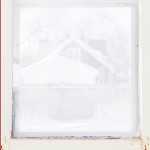1. What do you want to talk about — which question do you wish interviewers would ask, and what is your answer?
How would you describe the relationship between nostalgia and anxiety?
I think nostalgia can sometimes be a coping mechanism for anxiety. I went to see Detropia a few weeks ago – which I didn’t actually think was a good film, but there’s a person interviewed in it who explores abandoned buildings in Detroit that has this beautiful comment about her relationship to the past. She talks about how she imagines a ghost-narrative for her city, from when it was economically booming, superimposed on top of the one that exists now. But at the same time, I think having that nostalgic narrative can generate a certain amount of stress as well as wonder. It can be really overwhelming to be standing in a very quiet, empty place and know it’s thick with dead narratives, and recognize a lot of those narratives, while historic, can’t fit neatly into the parameters of nostalgia.
2. What advice do you wish you’d received, but didn’t, when you first started to take your writing seriously?
Look after your physical health. Your drive and hunger to finish things can help you, but they can also harm you. Really. Take ergonomics seriously, exercise, stretch, take breaks. Sitting down for a long time is actually pretty rough on the body, and I’ve already got wrist, hand and repetitive strain problems at 28. All those things were definitely exacerbated from spending extended hours on the computer, incessantly typing.
3. What is wrong with the publishing industry, and what are they getting right?
I don’t know if the publishing industry has found its equivalent to the crowd-sourced album quite yet… I feel like musicians seem to be using social media to support the physical production of their work more successfully than writers and publishers often are.
4. How will technology change writing?
I’m a bit of a Luddite in some ways – I still don’t have a cell phone, even. The expectation of speed in technologically-mediated writing is difficult for me. Someone tweets me, and I respond a week later, which doesn’t really work.
I think I’m most interested in the ways we use technology to shape the size of the room we think we’re conversing in. I’m still really fascinated by quasi anonymous online spaces like Craigslist or cruising / hookup and dating websites and how people interact with them. What gets said when you feel like you’re in a vacuum?
5. What is your process for a typical piece of writing, from idea to publication? (Give a specific example.)
Archipelagos – the last section in Cutting Room, was written as a long poem project last fall. I set up parameters for myself that I had to write every day for the month of November, all the writing had to belong to one poem, and I had to be more experimental with my line breaks and length than I usually am. I had a document on my computer that I’d come home every night to, open and work on, writing one continuous draft and editing in the document as I went. When that was finished, I edited the whole document, paired it with a photo of my messy bedroom, and put it together as a zine, which I made a small print run of. The zine text was distilled again and edited down with Kevin Connolly before it went into the book – sections were removed and the whole thing was relined significantly.
While I don’t always set up such stringent rules about what I’m doing – the idea of writing as a routine, having some kind of structure or puzzle I want to work out, editing simultaneously while writing, and making a very small print run of the work in zine format before other publications is often the route I go.
6. What are your daily habits as a writer, and as a reader?
I read poetry constantly, but read multiple books in fits and starts, and like having them all around me at the same time. There are four books beside my bed right now, and three open beside my keyboard. It’s difficult for me to leave the house with just one book.
I also carry a notebook with me almost all the time, or just end up with a crumpled pocket full of receipts with notes scrawled on the back of them.
7. What is your ambition as a writer — what do you want to accomplish, personally and professionally?
I want to write more books, but beyond that – I’m most interested in just trying new things. I want to do further film-making, and work on more collaborative projects, particularly if they’re experimenting with structure. I can find group work overwhelming at times – I’m interested in trying to find ways to work collaboratively that also suit or incorporate solitary tendencies. I also want to get better at critical / theoretical writing, and do more teaching.
8. Why don’t you quit?
I’m stubborn, or curious, or both. It depends on the day.
Sarah Pinder was born in Sault Ste Marie. Her poetry has appeared in various literary journals and small magazines, as well as the anthology She’s Shameless. She lives in Toronto.



